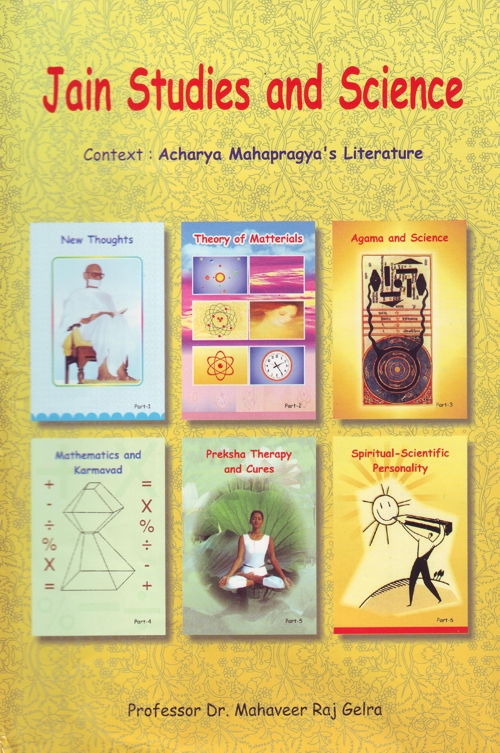An investigator who sets out in search of truth travels incessantly towards the aim of its revelation. Truth of our existence is all pervasive and omnipresent. It cannot be invented, it can only be explored. What is truth, how is it like, why is it so, with all these questions begins the journey of a truth-seeker and with the answers and solutions, the purpose of the journey gets accomplished. The enlightened person himself becomes the destination. The path undertaken by him looses its significance, as several paths are available to reach the same destination. This journey continues till the time the investigator reaches the pinnacle. Philosophy and science are two paths of truth-exploration. The main aim of their journey is to explore the esoteric secrets of life and the universe. The axis for the journey of philosophy is all-encompassing conscience, whereas for science, path of journey is the physical world. Both these branches of knowledge are not against each other, but are complementary to one another. The world of philosophy has explored the essence of life, thereby presenting many truths about cosmology, which are in league with modern science. Science too, if moves towards the exploration of consciousness, can become more effective.
Lord Mahavira has considered the knowledge of both soul and body important for the spiritual experience. This statement is expressed in Dasavealiyam Suttra:

jo jeeve vi nayaanai, ajeeve vi nayanai
jeeva ajeeve ayananto, kahani so nahii sanjamam (Dasave,4/12)
Without the Right knowledge of soul and non-soul, including matter, self- control cannot be achieved. This maxim of spirituality, in fact, expresses the scientific phenomenon of Jain studies. Lord Mahavira was a spokesman of spiritualism. He not only attained the state of transcendental consciousness himself, but guided his followers in that direction. Question thus arises, why those aspiring for soul-consciousness, need the understanding of materialistic world? He should be contended with the aspects of soul alone. What is the purpose of knowing other substances? It is because the cognition of Lord Mahavira was multi dimensional. He did not accept just one facet of existence, but kept the entire truth within the realm of his cognisance. In his philosophy, just as soul-consciousness has an identity, so has the matter. In totality of our existence, the importance of both 'body and soul', 'tangible and intangible' and 'physical and spiritual' is equally prevailing - one cannot outweigh the other.
The basic principle of Jain Philosophy is:

Meaning, "Whatever exists in the universe is in pair, as jiva-ajiva exist as a duo." In this context the views of Acharya Mahapragya are worth mentioning:
"Jain philosophy acknowledges dualism. Accordingly, soul (consciousness) and body (matter) - Jiva and Aj iva - are two basic realities. Rest all are just different manifestations of these two fundamental entities. As the sou 1 and body combine mutually in infinite probabilities to create the universe, Jain philosophy has adopted pluralistic approach, Anekant. In Mahapragya's opinion, no living being is free from the 1 im itations of consciousness. Soul and matter are the two basic bu ilding blocks of the entire existence and from this view point, duality is a truth."
This realistic acceptance by Jain philosophy has opened the new doors for the mutual coordination of Jain Study and Modern Science.
The study of Jain Philosophy is not only limited to spiritualism and axioms but also comprises various aspects of life. Jain literatures contain within themselves vast knowledge of spiritualism, religion, conduct, real nature ofthings, rules for motion and steady-state, theories related to matter, energy, direction, time, meditation, emotions, health, black-holes, existence of souls etc. The validity of these subjects is in consonance with various branches of science like physics, biology, cosmogony, cosmology, psychology, atomic science, health science, social science etc. The comparative analyses of these branches, provides a new and very contemporary direction to both philosophy and science.
Before the onset of 20th century, the critical study of philosophical subjects remained confined to the then prevailing concepts only. Science was either very weak or was not available at all. But ever since science has proved its presence in various disciplines it has become an inevitable part of any philosophical discussions or writings. A few writers have undertaken the mammoth task of unearthing the science contained in the ancient studies. One such prominent writer, whose name outstands in establishing communication between the ancient contents of Jain Studies and modern science is, Acharya Mahapragya. He has given a new outlook to Jain Studies.
Acharya Mahapragya, while presenting his ideas on science, says, "Truth is singular. It is beyond beliefs and experiments. Many believe that science has harmed religion and has withdrawn people from it. Many priests echo the same thoughts. But, reality is otherwise. My definite belief is that science has given credibility to the ancient secrets of religious scriptures which were otherwise unexplainable as their original rationalizations were not available. With the help of scientific researches, philosophical postulates can be elaborated very authentically. The comparative study of the branches of philosophy and science is therefore quite desirable. In such a situation many new dimensions of philosophy can be brought to light."
This wisdom of Acharya Mahapragya has found universal acceptance and has attracted number of contemporary thinkers, writers, literary people, social workers and scientists in this direction. His endeavours to achieve the confluence of thought and experiment have given a new awakening to our era.
This ideology of the writings of Acharya Mahapragya has inspired Prof. Mahavir Raj Gelra to compile this literature - 'Jain Study and Science: Context: Acharya Mahapragya's literature'. Presenting the background he says, the writing of Acharya Mahapragya has been authoritative in Jain Philosophy, science and psychology. The rich abundance of his writings has all the possibility to take the shape of a complete book for the benefit of the readers. I thus planned to mould the scattered jewels of Mahapragya's literature into an exquisite ornament."
Prof. Mahavir Raj Gelra, a scientist by profession, has dwelled deep into the secrets of philosophy with his scientific background. Because of his distinctive oratory style, he is able to convey his ideas to the audiences in a very organised and authentic manner. As a result, audiences" interest and curiosity are aroused.
Prof. Mahavir Raj Gelra has compiled this literature in the light of Acharya Mahapragya's literature. In a paragraph of Epilogue entitled - "Coordination of Science and spiritualism" he has presented various subjects of Mahapragya's literature before the readers. Prof. Gelra has not only compiled the thoughts of Acharya Mahapragya but has appropriately blended the modern scientific concepts also. Some of its examples are given below which vindicate the depth of his scientific knowledge -
- In the discussions of motion and velocity, the mention of mutual relation between mass and energy as given by Einstein in equation E = mc:, attracts the students of science towards the study of philosophy.
- Agreeing with the interpretation of Mahapragya on the resonance of Karma, the writer puts it as, "the probable reason for connecting the breathing and determination with the Karma is because of their similar physical nature as they all are made up of fine matter. It is important to note that fine matter interacts with the other fine matters easily."
- Mahapragya has maintained all along in his literature that the unique concept of Keval Gyan is a realistic scientific possibility. Dr. Gelra has further strengthened it by applying the fundamentals of mathematics. His use of mathematical entities of zero and infinity is truly path breaking. "In mathematical equations, when one parameter assumes infinite value, the other associated with it automatically becomes zero and vice-versa. A Keval-Gyani has an infinite speed of perception, therefore the time required to travel becomes zero irrespective of the distance involved. Thereby, shrinking all the three dimensions of time - the past, the present and the future - into one entity of moment." Chapters on Direction, Time, and Universe etc., too contain the sparkles of his scientific temperament, which is highly commendable.
The learned author's work is mainly a compilation; he has placed forward his genuine and spontaneous thoughts within the realm of established scientific theories. His novel interpretations may or may not find acceptance with other thinkers, however his efforts have broadened the horizon. In this context, his discussions on Syadvada are highly thought provoking. Excerpts from the book-"The scientific principle of uncertainty has an immediate alibi in the form of Syadvada. When a micro entity is in motion, two possibilities exist-
- When behaving as a particle, the wave nature is obscured and vice-versa.
- For an observer, it is impossible to correctly predict the behaviour of a micro entity either as a particle or as a wave. This 'uncertainty of science' is the 'unpredictability of Syadvada'. Interestingly, this uncertainty or unpredictability arises not due to the characteristics of the entity but due to the inadequacies of the observer's perception and limitation of his knowledge."
Commenting, Mahapragya says, "Dr. Mahavir Raj Gelra is a great scholar of Jain Agamas while simultaneously keeping himself acquainted with the latest happenings in the world of science. This aspect of author is manifested repeatedly throughout the present work. Dr. Gelra is a born Jain and a trained scientist. His strong association with Terapanth and his unequivocal presentation of Jain fundamentals has earned him the laurel of'Terapanth Spokesman' by none other than the Rev. Ganadhipati Shree Tulsi. I strongly believe that his present work, namely. "Jain Study and Science: Context - Acharya Mahapragya's Literature' will prove to be a milestone and beacon to all those who seek the confluence of -cience and spiritualism. This endeavour of Dr. Gelra is just a good beginning from where he has to travel a long way ahead."
I had the privilege of editing this book, when published in Hindi in 2005. I am immensely pleased to find that its translation in English is ready within a year's time. I specially record thanks to Shri Piyush Jain for this commendable work of translation and the re-edition of the book, which carries various technical terms of Jain Philosophy. I would also like to thank Shri R.L. Parakh, Churu (Rajasthan) for the financial assistance for the publication of this book.
In Acharya Mahapragya's literature, various aspects of Jain Philosophy, like, Sociology, Economics, Health-science, Psychology, Physics etc. have been discussed in great depths. This treatise is created keeping only scientific concepts at the centre. Scholars from various fields can select various other topics available in Mahapragya's literature for their writings, thereby, contributing in the expansion of Jain studies.
I firmly believe that this project undertaken is a right step in the direction of achieving its goals.
SAMANI MANGALPRAGYA
Vice-Chancellor,
Jain Vishva Bharati Institute
Ladnun (Raj.).
 Dr. Mahavir Raj Gelra
Dr. Mahavir Raj Gelra

